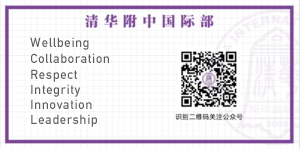
李文平校长:卓越人才的成长途径——
为学生创建自主发展的场域
Ms.Wenping Li: The Pathway to Excellence – Creating a Field for Students’ Self-Development
向左滑动查看英文
Swipe to the left for English version
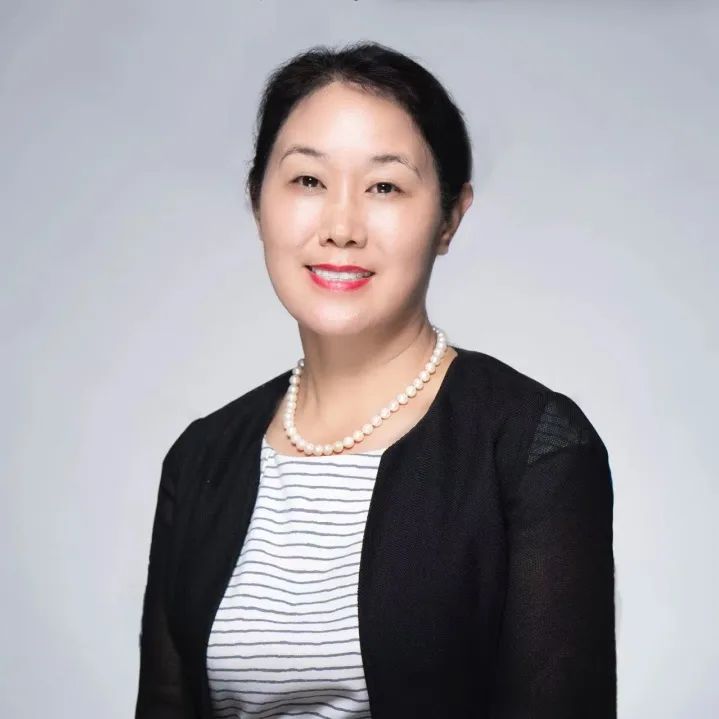
清华附中国际部执行校长李文平女士参加2023北京大学SOMIS校长论坛,并发表主题为“卓越人才的成长途径——为学生创建自主发展的场域”演讲。李校长从支持学生自主发展、培养卓越人才所秉持的教育理念,以及在该教育理念下,在显性的课程场域和隐性的活动场域为学生搭建的自主发展平台三个主要方面,结合清华附中国际部的教育实践,为参会嘉宾带来了一场精彩绝伦、富有启发的分享。
01
教育理念:
找到热爱,做出改变
著名的教育家苏霍姆林斯基认为,“只有促进学生自主发展的教育才是真正的教育。”
李文平校长指出,当学生把自己的才能、自己的热爱或者特长,用于服务他人、改变社区、贡献社会的时候,就会产生一种成就感,而这种成就感就会化为“内驱力”,促进学生的自主发展。卓越人才不仅要有丰富的社会参与、自主发展和文化基础——即“德”、“才”兼备,还应该以习近平总书记对新时代中国青年的期待:有思想、有本领、有担当为目标,更好的为自己所在的社区和世界作出积极的贡献,成为心里有梦、脚下有路、眼里有光的人。乔布斯在斯坦福大学毕业典礼上的致辞提到,“唯一做伟大工作的办法就是爱你所做的事情。”所以,李校长坚信Find your passion,尤其是在高中阶段,找到自己所爱,找到自己的理想和目标非常重要,它能支撑你的人生过得更有意义,成为一个卓越的人才,成为为世界作出贡献的人。
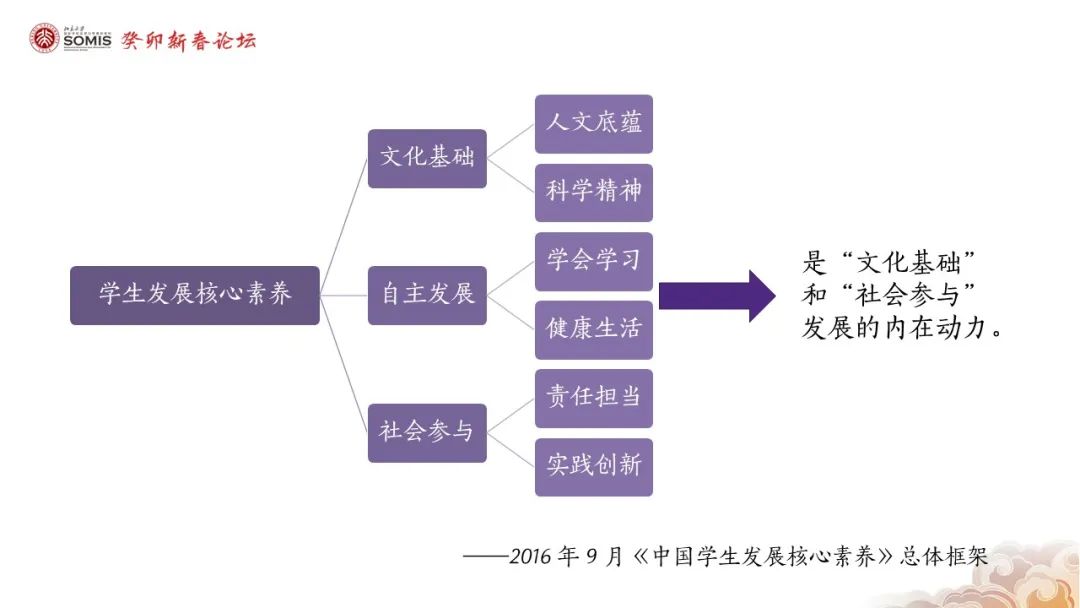
“钱学森之问”提出,“为什么我们的学校总是培养不出杰出的人才?”钱理群之忧“,则是钱理群教授对我们现在所进行的教育是是否在培养一批“绝对的,精确的利己主义者”的担忧。李校长对问题持续思考,提出:第一,我们要帮助学生找到所爱,激发他的潜能,激发他的强项,让他去自主发展,也许这才是我们培养杰出人才的指导方向。很多时候教育者都是在想要补短板,却不反过来激发学生的强项;如果让学生在他的强项方面能够自主发展,他就能够成为卓越的人才。第二,我们培养的学生不能以一个考上好大学、找到好工作为目标,教育者一定要在中学阶段就培养学生服务社区、贡献社会的意愿,获得用自己的才能去帮助别人、改变社会的成就感,有了这样的格局和担当,我们的学生才能未来为社会做出杰出的贡献,成为卓越的人才。
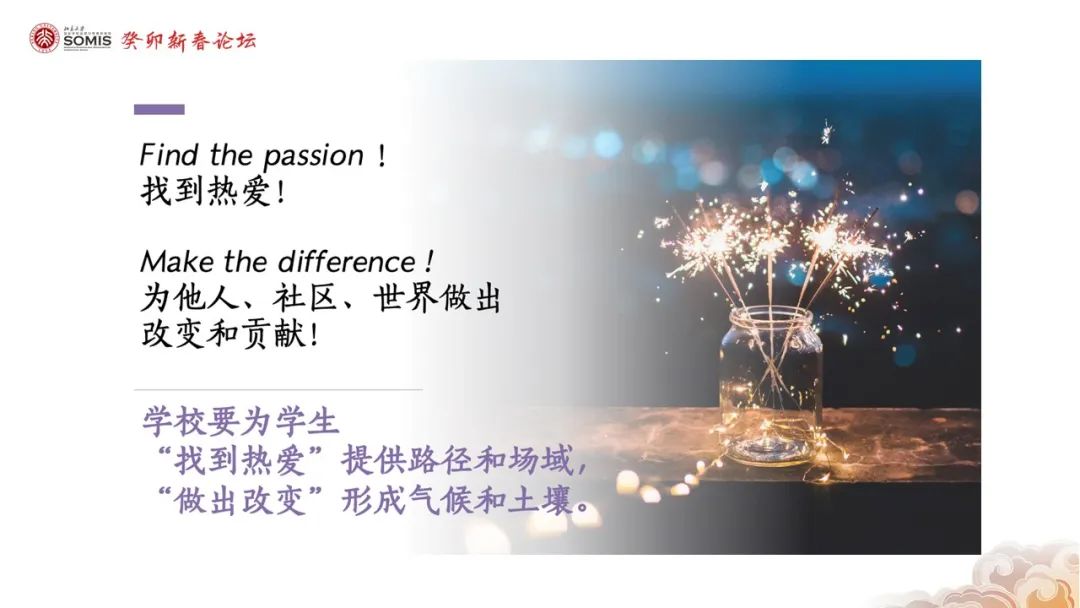
作为学校,我们要为学生找到热爱提供路径和场域,要为学生的改变,形成气候和土壤。其中的一个例子,是曾经在国际部的一名高中生,想在学校开设一门新闻学的选修课,并且自己担任该课程的主讲老师。学生在学校开课,按理说是很不现实的,但国际部非常呵护学生的自主性和学科热爱,经过与学术校长、课程主任、英文任课老师等反复沟通,最终给予了学生试讲的机会,并持续不断地给予他指导,支持他做与新闻学相关的各种研究。国际部对待课程是非常严肃严谨和高标准的,为保证课程的质量,老师们每周还额外安排两次会议,全程跟进上课、备课、作业设计、教学评价等过程,尽可能地去支持和帮助他改善过程中的问题。这个学生特别热爱新闻,他认为新闻学可以满足他对正义感的执着追求;在校读书期间,他的文章也是总是活跃在学生会的公众号和学校的校报上。2020年,他被布朗大学录取,但因为疫情原因暂缓一年就读,他就又回到国际部做助教,又跟老师一起授课。从这样一个小例子中不难看出,学校应该为学生的自主发展提供场域,搭建平台,充分为学生的热爱和潜能提供可能性。
02
显性的课程场域
学校在显性的课程场域如何支持学生自主发展?李文平校长讲到,“学生的自主性是一种沉睡着的力量,教育就是用教育的艺术唤醒学生的主体意识。”从老师层面,我们的老师应该赏识和激励学生,让学生在赏识和激励中变化成长,认可孩子的努力;用爱唤起每一位学生心底的学习热情,是老师的重要的责任。坚持帮助学生发展强项,激发学生的内驱力,引领学生的自主成长,这是学校坚信的教育理念。
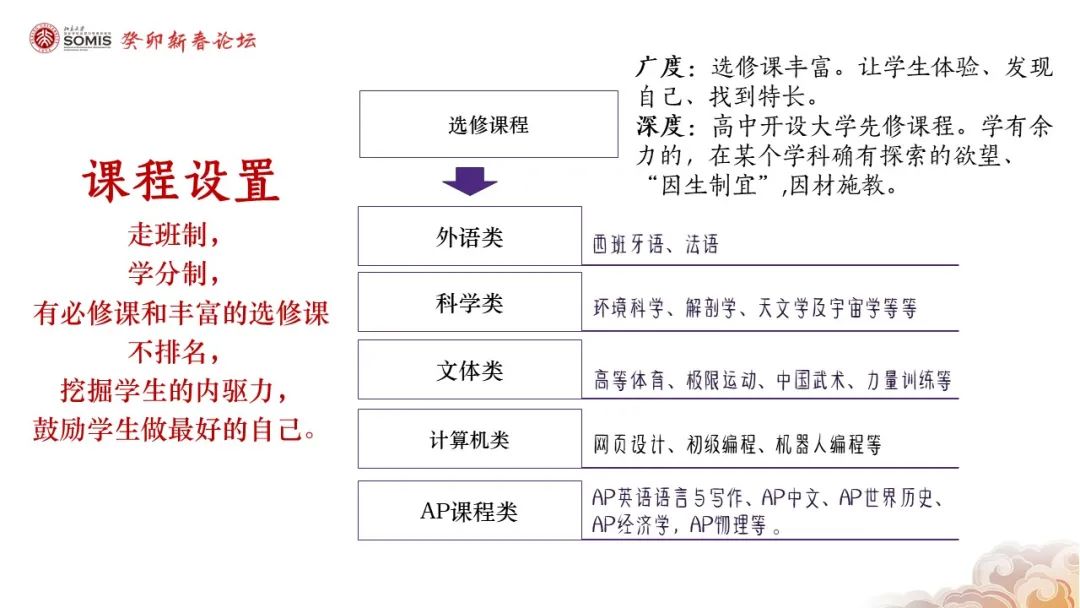
从课程设置上,学校实行小班化教学和走班制,设置必修课和选修课,不排名的机制鼓励学生做最好的自己。同时,学校提供丰富的课程,竭尽所能的满足学生的成长。从广度上,有各类的选修课让学生去体验和发现自己的特长,为学生提供各种资源的支持和发展特长的机会,比如高研实验室等。从深度上,学校开设了美国大学先修课程(AP);学有余力的学生,学校会帮助学生到大学教授的实验室中,跟着大学老师去做实验,来发展他的特长,从而因材施教,“因生制宜”,充分从课程理念和实践上,满足学生的需求。
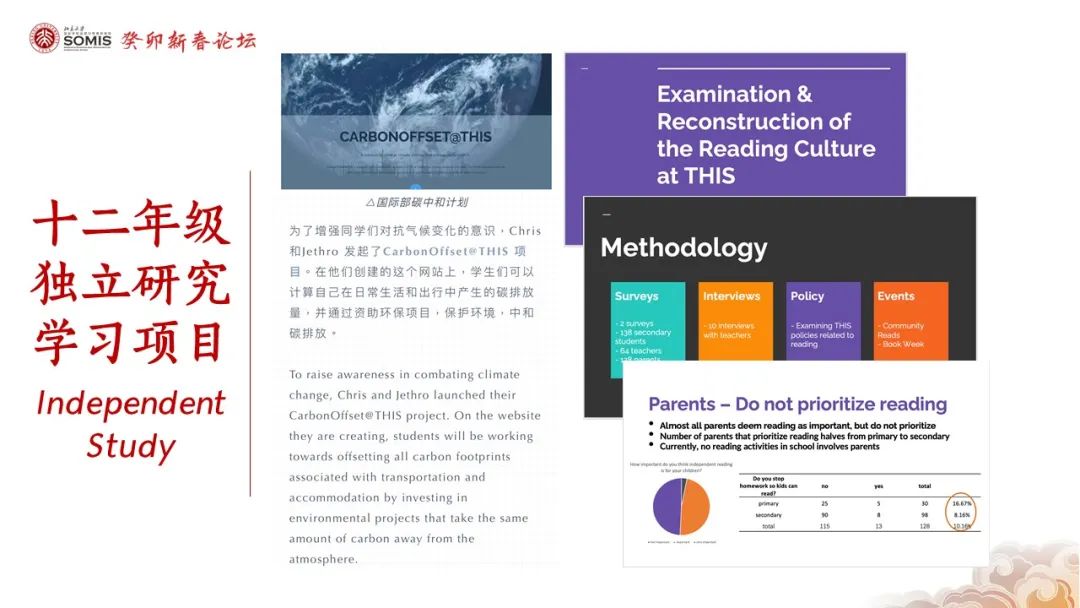
在清华附中国际部,十二年级的独立研究项目是学校给学生提供自主发展的场域的一个典型例子。独立研究学习的课程是由十二年级毕业生自行设计课题,确定选题,提交开题报告,学校会匹配老师对他进行一对一的指导。学生自行研究的话题领域非常广泛,涉及到遗传学和癌症安全与投资的研究,量子力学的研究,编曲制作,岛屿生态学等等;学生设计的研究课题非常多,比如用美术中的色彩唤起情绪,火箭的颜料与管嘴设计,使用AI进行影评的方法和应用,广告中的行为经济学等等。其中,有一名学生还撰写了原创书籍作品《量子物理的前世》,过程中参阅了很多的中外书籍资料,用浅显易懂的文字书写量子物理的前世,这名同学目前正就读于普林斯顿大学。
除此之外,小学和初中的毕业设计项目也为学生提供各种可能性,学生自主选题,关注全球各类问题,并尝试找到解决方案。在过程中,跟随老师的指导,学生进行基础研究,学习做科学研究的方法,查阅资料、收集数据、制定方案……学生的批判性思维能力在设计项目的过程中得以培养。
在教学方式上来讲,国际部使用基于理解力培养的逆向教学设计,就是understanding by design (UBD) 的教学和备课模式,同时采用项目式教学、探究式教学、跨学科综合学习、体验式学习、服务性学习这种丰富多彩的综合的学习方式,让学生在真实的生活体验中感受知识的魅力,从而将所学迁移到生活中,让学习和生活产生连接。
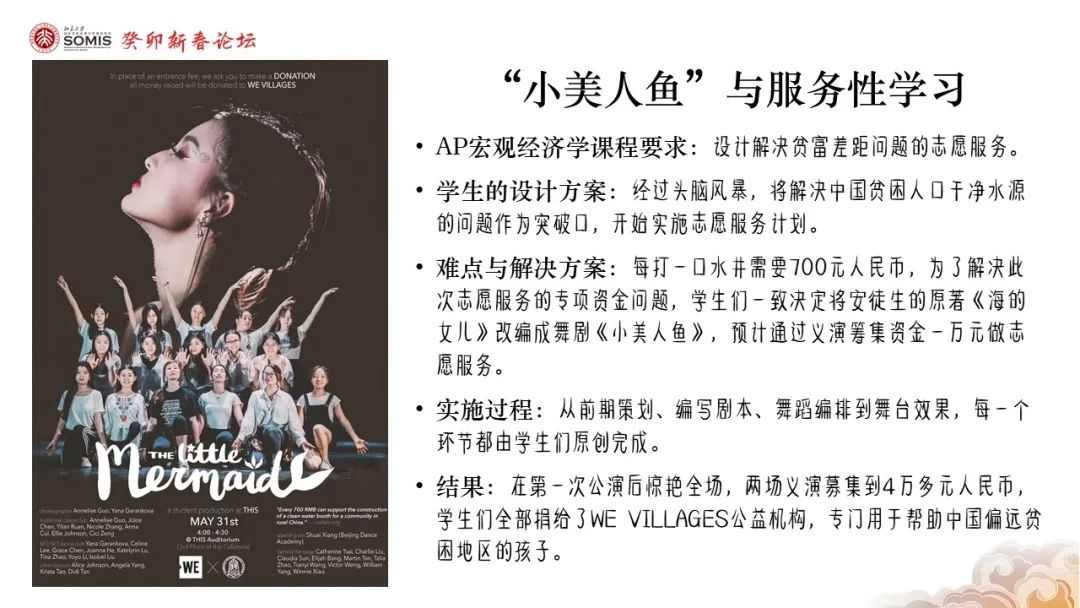
其中,李文平校长举例“小美人鱼“与服务性学习的故事。高中的AP宏观经济学的课程要求学生设计解决贫富差距问题的志愿服务,学生们经过头脑风暴,将解决中国贫困人口干净水源的问题作为突破口,开始实施志愿服务计划。但其中的难点在于资金筹集问题,每打一口水井需要700元人民币。为了解决资金问题,学生们一致决定将安徒生的原著《海的女儿》改编成舞剧《小美人鱼》,通过义演筹集资金一万元做志愿服务。从前期策划、编写剧本、舞蹈编排到舞台效果,每一个环节都由学生们原创完成。舞剧由民族舞社和现代舞社的同学们合作完成,第一次公演就惊艳全场,两场义演共募集到4万多元人民币,学生们全部捐给了WE VILLAGES公益机构,专门用于帮助中国偏远贫困地区的孩子。在这样一个学习项目的过程中,学生的团队合作能力、领导力、沟通能力,学生的志愿服务精神,自主自主意识的培养完全展示出来。当学生的学习和社区服务社会服务连接起来的时候,学生的心胸会更宽,格局会更大,这样的教育可能才有可能避免培养精致的利己主义者。
03
隐性的活动场域
在隐性的活动场域,李文平校长提到,我们通过学科主题日活动、社团活动、公益慈善活动、社会实践和文化考察活动以及科研导师项目等方式,支持学生的自主发展。比如,每一个学科在每一学年都会有一天的学科活动日,例如说语文学科的China Day,数学的Pi日,科学节,历史日等等。在这一天,学生自主设计展示学科中的所学,以及未来可以探究的内容来做成自己的项目设计,集中展示出来。
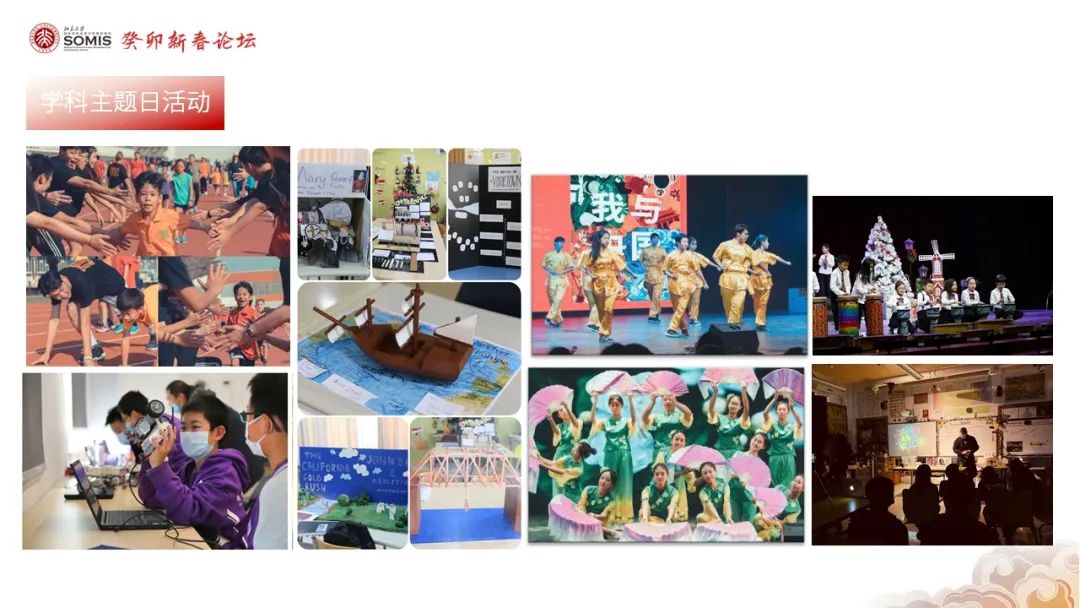
在学校的各种大型活动里,学生们永远是主角,在演出里,学生是主持、是嘉宾、是演员,在学校的开放日里,学生是宣讲人、是校园导游、是主人。当学生主动的向其他人介绍学校时从内心油然而生的自豪感,对于学生是特别有意义的;学生的社团也是由学生主导,给予学生很多第一次尝试的机会,最终学生收获满满的成果。李校长常和老师们说,有机会让学生做的,老师都要退后让给学生去做,把主人交给学生;我们要智慧的选择,用我们的“不为”来成就孩子的“有为”。
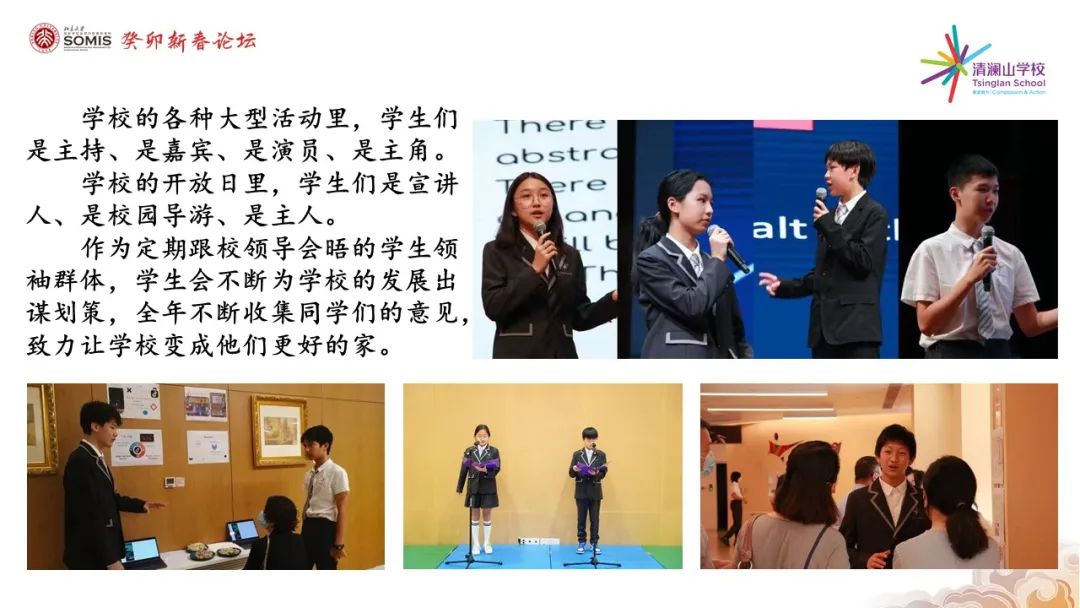
清华附中国际部有一位同学,他特别热爱数学,在数学领域有特别深的研究。比如,搅拌一杯咖啡,他就会用科普学的角度将其理解为基本学,然后进而再用代数去解释和分析。他对数学特别着迷,参加了很多世界殿堂级的赛事,取得了很好的成绩。他不仅自己热爱数学,还将这份热爱传递给了初中的学弟学妹们,带领数学和科学两个社团,激发了很多学生的对数学和科学的热爱,营造了很好的学习氛围。这样的学生,他不仅能独善其身,也能为国际部社区做出积极的贡献,今年他被MIT和剑桥大学同时录取,我们相信这样的力量也会支撑着他继续前行,很为他感到骄傲。
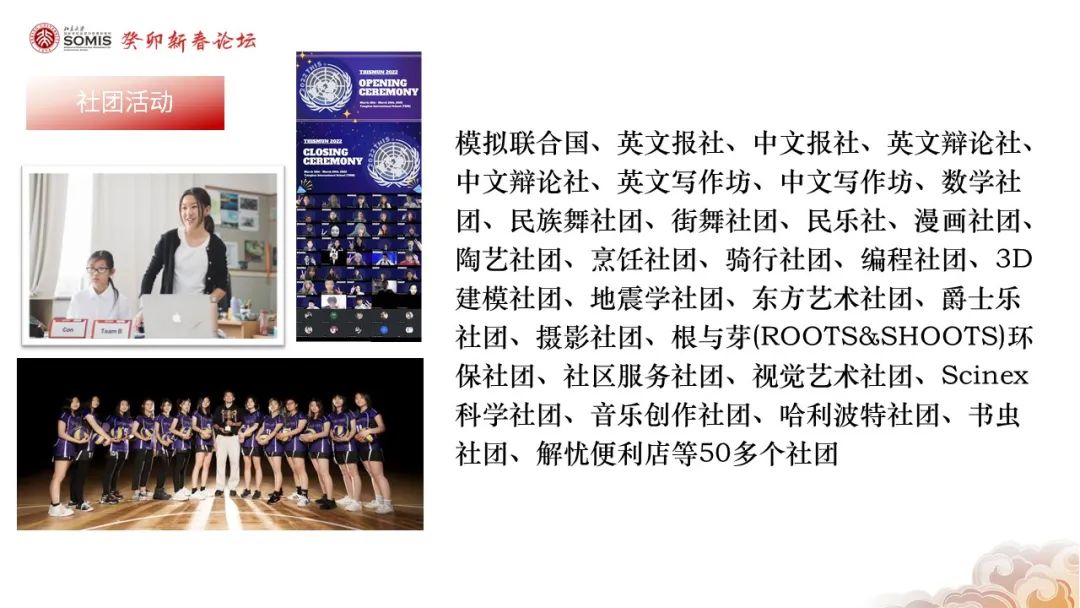
李文平校长继续分享了另一个例子,是曾经有一位毕业生,她在国际部就读期间经常参加中文辩论,在中文老师钱超的指导和带领下,以扎实的中文基础,我们学校的学生屡获冠军。在中文辩论中,她深深体会到了思辨的乐趣。但在北京蒲公英打工子弟学校支教的经历让她发现,那里的学生不缺好的教材,但是缺乏求知欲,不知道为什么要学习,缺乏思辨能力。她就发愿,将中文辩论上学到的思辨能力也带到了蒲公英打工子弟学校。她不仅去支教,还拉赞助,带领学校的学生一起参加亚洲辩论会等。21年她被斯坦福大学录取后,也没有就此终止做公益,在开启大学生涯之前的一年Gap year中,她进一步通过义卖的方式为蒲公英学校购置美术教材,同时带打工子弟的同学们到国际部来做了7天的思辨和STEAM的夏令营,招募了清华附中本部和国际部的同学来给这些同学做小老师,进行志愿支教。李校长动情地说道,“我特别被她感动,我问她,你都毕业了还在做这样的事情吗?白小舟同学的答案是肯定的。我觉得这样一名有格局、有担当的高中毕业生既能以自己的学业本领被名校录取,还能以善心和大爱传递公益精神,就是我心中卓越人才的样子。“
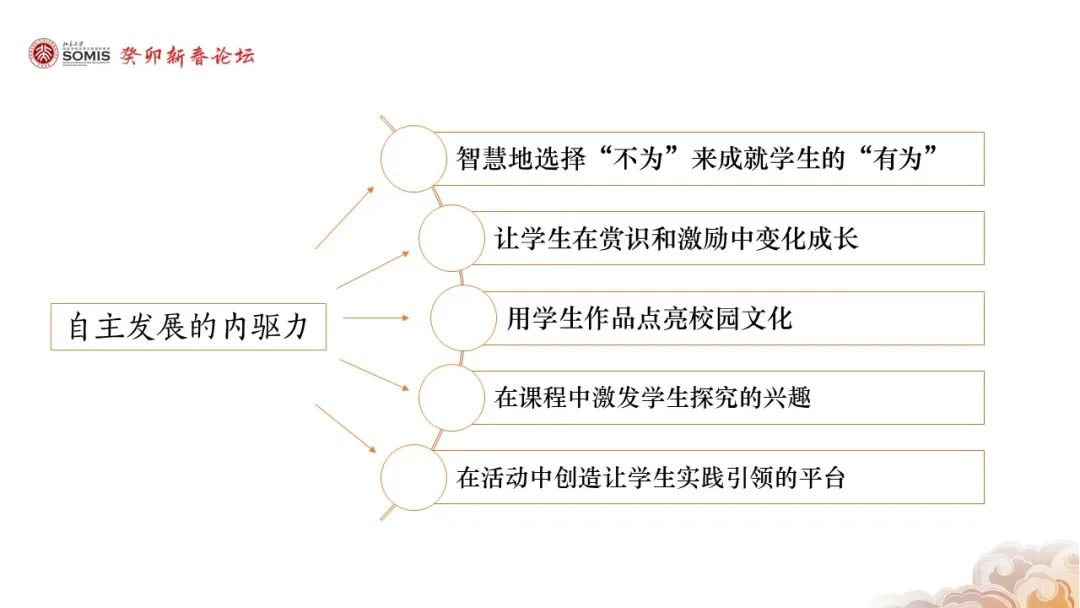
最后,李文平校长总结到,让我们智慧的选择不为来成就学生的有为,让认可学生的努力和进步,让学生作品点亮校园文化,在课程中激发学生探索的兴趣,在活动中创造让学生实践和引领的平台,激发学生的自主成长意识,让学生有内驱力,培养自主发展的卓越人才。

Ms. Li Wenping, Executive Principal of Tsinghua International School (THIS), for the 2023 SOMIS Principals’ Forum at Peking University delivered a speech themed “The Pathway to Excellence – Creating a Field for Students’ Self-Development.” The inspiring speech focused on supporting students’ independent development and cultivating their outstanding talents by building a platform for students in both the explicit curriculum and implicit activities within the educational practices at THIS.
I.
Education philosophy: find your passion and make differences to the world
The famous educator Sukhomlinsky mentioned that “Only that education is true which leads to the independent development of the student, to his ability to think, to judge, to choose, to create, to act.” (Sukhomlinsky, 1978)
Principal Li pointed out that when students use their talents, passions, or skills to serve others, they experience a sense of achievement that will turn into an “internal driving force” that promotes their independent development. Outstanding individuals should not only have both “virtue” and “talent,” but they should also aim to meet General Secretary Xi Jinping’s expectations for China’s young people in the new era: having a vision, capability, and a sense of responsibility. These youngsters should make a positive contribution to their communities and the world, becoming people with dreams, paths, and light in their eyes. Steve Jobs mentioned in his 2005 speech at Stanford University’s graduation ceremony, “the only way to do great work is to love what you do.” Principal Li firmly believes that students should find their passions and in high school, developing their own ideals and goals, which can support them to live a more meaningful life.

Qian Xuesen’s question raised, “why can’t our schools cultivate outstanding talents?” Qian Liqun’s concern is whether the education we are currently conducting is cultivating a group of “absolute, precise egoists.” Regarding this issue, Principal Li proposed that:
First, we need to help students find their passions, stimulate their potential and strengths, let them develop independently. Perhaps this is the guiding direction for us to cultivate outstanding talents. Many educators often focus on improving students’ weaknesses but fail to stimulate their strengths. If students can develop independently in their strengths, they can become outstanding talents.
Second, we cannot cultivate students whose only goal is to get into a good university and find a good job. Educators must encourage students to serve their communities and contribute to society during their secondary school years. By using their talents to help others, students will gain the right mindset and a sense of responsibility becoming active contributors to society.

As a school, we should provide paths and fields for students to find their passions and create a climate and environment for their growth. For example, a THIS high school student who had a keen interest in journalism wanted to bring a journalism course to the school. Because THIS promotes students’ independent thinking and love for subjects, the academic dean, curriculum director, and English teacher supported the student to learn about teaching and provided guidance for her research related to journalism. The elective course opened with the lead teachers meeting weekly with the student to follow up on teaching pedagogy, lesson planning, homework design, and assessment to help the student develop her skills while ensuring quality and standards were maintained for the class. During her time at THIS as a full-time student and as a student teaching assistant, this student’s articles about justice were often featured on the Student Council’s WeChat account and in the school newspaper. In 2020, she was accepted to Brown University.
II.
The Explicit Field:
Curriculum
How does the school support students’ independent development in explicit curriculum fields? Ms. Li stated that “students’ autonomy is a power in sleep, and education is the art of awakening students’ subject consciousness.” From the perspective of teachers, our teachers should appreciate and motivate students allowing them to grow and change through recognition and encouragement. It is the teacher’s critical responsibility to acknowledge their efforts and use love to awaken every student’s enthusiasm for learning. The school’s educational beliefs should include the insistance on helping students develop their strengths, stimulating their inner drive, and leading their independent growth.

In terms of curriculum design, the school provide smaller class sizes, a homeroom advisory system, and compulsory and elective courses with a non-ranking mechanism to encourage students to be their best selves. In terms of breadth, the various elective courses allow students to experience and discover their strengths, providing opportunities for them to expand their resources that includes high-level research laboratories. In terms of depth, the school offers Advanced Placement (AP) courses, and for students with spare capacity, the school helps them join university professors in laboratories to do experiments and develop their strengths, providing tailor-made education and fully satisfying students’ needs from curriculum ideas and practices.

At Tsinghua International School, the twelfth-grade independent research project is one example of a field the school provides for students’ individualized development. In this offering, seniors design their own projects, submit proposals, and receive one-on-one guidance from teachers assigned by the school. A wide range of research topics have been explored such as genetics, cancer safety and investment, quantum mechanics, orchestral production, and island ecology. THIS students have designed colorful artworks to evoke emotion, paint and nozzle design for rockets, methods and applications for film critique using AI, and behavioral economics in advertising. One student had written an original book, “The Past Life of Quantum Physics,” in which he consulted numerous Chinese and foreign books and sources to write about the history of quantum physics in easy-to-understand text. This student is currently studying at Princeton University.
The primary and middle school capstone projects offer a variety of possibilities for students to choose their own topics, focus on global issues, and encourage them to find solutions. Through this process and with the guidance of their teachers, students learn how to conduct basic scientific research which involves information review, data collection, and develop solutions ……
In terms of teaching methods, THIS uses the Understanding by Design (UBD) model for teaching and lesson planning, focus on project-based teaching, and interdisciplinary, experiential, and service-learning. This inquiry approach allows students to engage with authentic experiences with the hope that they can transfer what they have learned to real life.

Ms. Li cited the project “The Little Mermaid” service learning as an example. The AP Macroeconomics course in high school required students to design a volunteer service project to address the basic needs inequities between the rich and poor. Students brainstormed a solution to address the problem of clean water access for the poor in China. The challenge was to raising funds to pay for water wells that costed 700 RMB each. The students unanimously decided to adapt Hans Christian Andersen’s original book “The Sea’s Daughter” into a dance drama “The Little Mermaid.” This benefit performance was aimed to raise 10,000 RMB. From pre-planning, script writing, dance choreography to stage effects, every aspect was done originally by the students. The dance was a collaboration between students from the Traditional Dance Club and Modern Dance Club resulting in a stunning public performance. The two benefit shows raised over 40,000 RMB, all of which was donated to WE VILLAGES, a charity dedicated to helping children in remote and impoverished areas in China. During the course of such a learning project, the students’ teamwork, leadership, communication skills, volunteer spirit, and their sense of autonomy were fully demonstrated. When students’ learning is connected with community service, they will broaden their mindset and gain a bigger picture perspective.
III.
Implicit Field:
Extracurricular Activity
Ms.l Li mentioned that we support students’ independent development through subject theme days, club activities, public welfare charity events, social practice, cultural exploration activities, and research mentorship programs. At THIS, each academic department hosts a subject specific day or event every academic year – e.g. China Day for Chinese department, Pi Day for math, Science and Technology Week, and History Day. Students design and showcase their projects or talents based on what they have learned in the subject and what they can explore in the future.

In various large-scale school activities, students are always the protagonists. Students are emcees, guests speakers, and actors. In open days, students are presenters, campus guides, and hosts. The sense of pride that arises from students actively introducing the school to others is particularly meaningful. Student clubs are also student-led, providing students with many opportunities to try new things and ultimately reap fruitful results. Principal Li often tells teachers that if there is an opportunity for students to do something, teachers should step back and let students do it. We need to make wise choices and use our “non-doing” to achieve children’s “doing”.

There is a senior student at THIS, who has a special love for mathematics and has a deep understanding in the field. When he stirs a cup of coffee, he uses a scientific approach to understand it as a basic study, and then uses algebra to explain and analyze it. He is particularly fascinated by mathematics and has participated in many world-renowned competitions, achieving excellent results. He not only loves mathematics himself, but also passes on this love to middle school students, leading both the mathematics and science clubs inspiring others to love mathematics and science. This kind of student not only is growing himself, but he is also contributing positively to the international school community. This year, he was accepted to both MIT and Cambridge University.

Ms. Li continued to share another example of one of our graduates, who often participated in Chinese debates during her time at THIS. Under the guidance of Chinese teacher Mr. Qian Chao, our school’s students regularly win championships and are recognized for their solid Chinese foundations. In Chinese debate, this student deeply felt the joy of critical thinking. Her experience teaching at the Pugongying School for Migrant Workers in Beijing made her realize that the students often lacked the desire to learn and the ability to think critically. With this, she vowed to bring the critical thinking skills she learned from Chinese debate to the Pugongying School. In addition to her volunteer work, she also raised funds and led the school’s students to participate in the Asian Debate Championship. After being accepted by Stanford University in 2021, she did not stop doing charity work. In her gap year before starting college, she further purchased art materials for the Pugongying School through charity sales and organized a 7-day summer camp for critical thinking and STEAM. She brought the migrant worker students to the international school recruiting students from both the Tsinghua University High School and THIS as “little teachers.” Ms. Li was deeply moved by her actions and said, “I asked her if she was still doing this kind of charity projects after graduating, and her answer was affirmative. I think a high school graduate with such vision and responsibility who can be admitted to a top university with their academic abilities and also transmit the spirit of public welfare with kindness and love is what I envision as an outstanding talent.”

In summary, Ms. Li emphasized that we should focus less on students’ achievements, but rather to recognize their efforts and progress. We should showcase students’ work elevating the campus culture, stimulate students’ interests through the curriculum, create platforms for students to practice as well as lead activities, to inspire students’ self-growth awareness, to cultivate talents who are driven from within and develop independently.

文字整理,排版 Editing | Mercy Xu
审核 Auditing | Dieu-Anh Nguyen, Toni Dong, Wenping Li
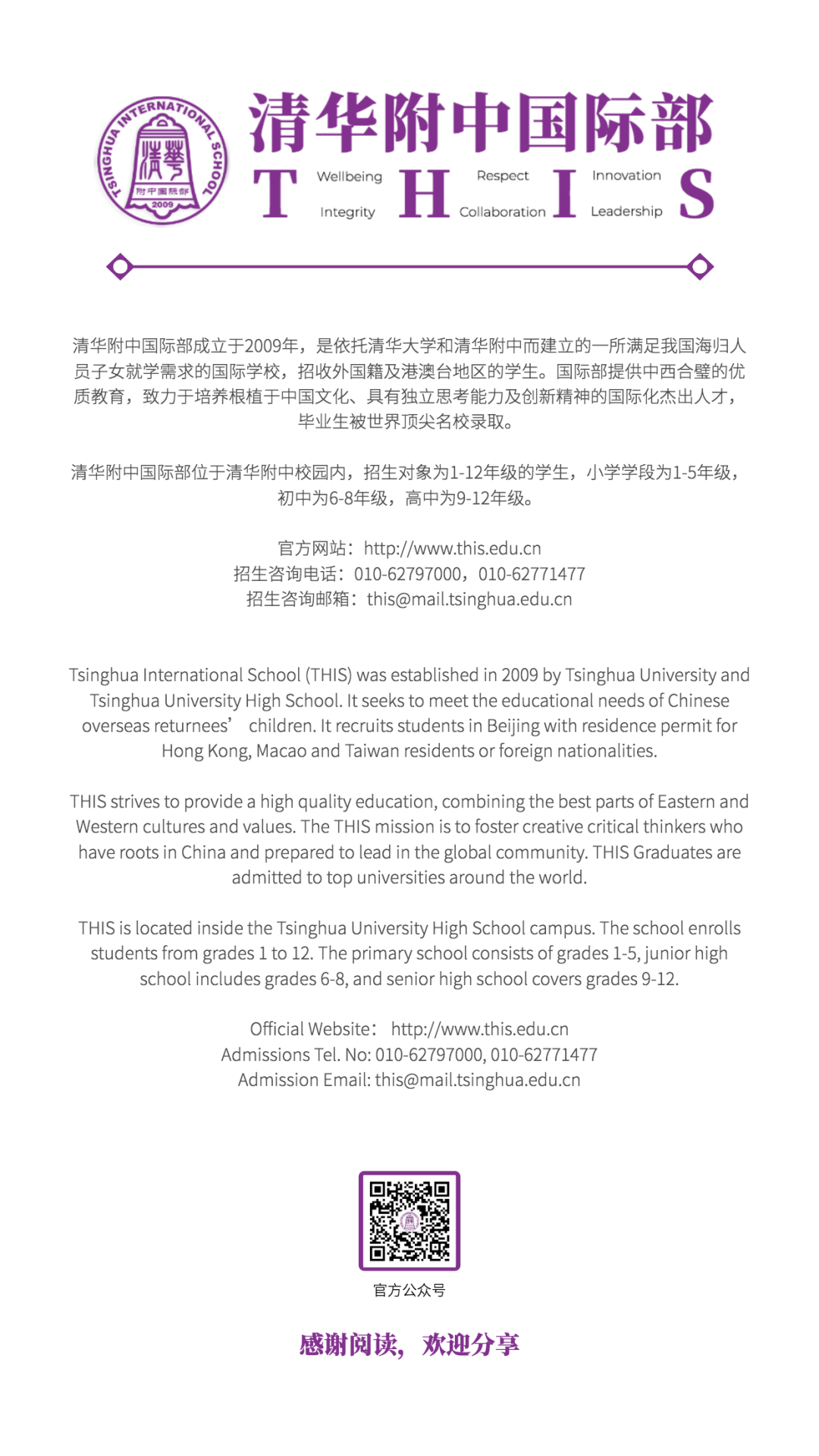
本篇文章来源于微信公众号: 清华附中国际部



